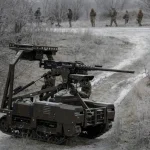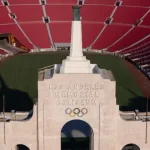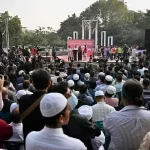 The general elections in Pakistan, taking place on11th May, 2013, saw the greatest voter turnout in the country since the 1970s. Despite growing concerns of terrorism and violence, people came out in hordes to vote for their favorite political party, amidslogans of change. What happened that day went down in history as a huge transformation. One year onwards, the common man still waits to reap the benefits of that so-called transformation – the smooth transition of power, changing hands from one democratically elected government to another. The common man is as hand-to-mouth as he was before, battling each day as it comes, not only to fulfill the demands of daily life but also to fight the worsening law and order situation in the country.
The general elections in Pakistan, taking place on11th May, 2013, saw the greatest voter turnout in the country since the 1970s. Despite growing concerns of terrorism and violence, people came out in hordes to vote for their favorite political party, amidslogans of change. What happened that day went down in history as a huge transformation. One year onwards, the common man still waits to reap the benefits of that so-called transformation – the smooth transition of power, changing hands from one democratically elected government to another. The common man is as hand-to-mouth as he was before, battling each day as it comes, not only to fulfill the demands of daily life but also to fight the worsening law and order situation in the country.
Just months before the elections, we saw the emergence of a new figure on the political stage of Pakistan, in the shape of Dr. Muhammad Tahir-ul-Qadri, initiating a political campaign and calling for a democratic revolution in the country. A Nation that witnesses changes in the political dynamics of the country on a regular basis, whether in the shape of huge political rallies, long marches or the making and breaking of coalitions, certainly did not find it difficult to accept the arrival of a new figure in the realm of Pakistani politics. As we sat glued to our television sets to see the drama unfold, some with awe, others with skepticism, the media’s primetime being flooded by the cleric’s sermons and visuals of his long march, some could not help speculating as to the purport of his endeavor.
As Dr. Qadri has given yet another call for a long march in the country, or as he calls it, ‘The Green Revolution of Pakistan’, the theories surrounding his sudden emergence in Pakistani politics again take effect. Many speculate that he may be the result of western interests and influences in the country, and the reason behind this theory is very obvious; his coming from a foreign state, his liberal and unconventional stance on religion, merging Islamic ideals with modern western ideals and specially his theory on terrorism, all point to that. The problem is that the common man of Pakistan is so fully engrossed in the minutiae of everyday problems that he hardly keeps track of the changes taking place on the global front, especially in South-East Asia and the Middle East, whether it is the scheduled withdrawal of American forces from Afghanistan, the fast changing political scene owing to elections in our neighboring countries or our relationship with Iran.
Perhaps if the West is backing him, it is because they have realized that an unstable Pakistan is not in their interest at this. They, however, want a friendly government, conducive to their expectations in the region and particularly to facilitate the withdrawal of American troops. In this backdrop, a ‘piedpiper’, who can lure the masses by playing their favorite tune and can relate to different classes of people on many different levels, suits them well.
The second theory behind Dr. Qadri’s becoming a significant anomaly in the arena of political activism is that the military establishment of Pakistan is perhaps supporting him, the military’s repeated promises of abstaining from politics notwithstanding. Those who present this theory argue that since the military establishment has always been involved in curtailing the lives of civilian governments, they cannot remain inactive from politics for long. They further argue that Tahir-ul-Qadri’s agenda is fully in tune with the wishes of the military establishment; he wants to cleanse the political system – is against suicide bombings -wants to reform the judiciary, etc.
This belief is further strengthened by Dr. Qadri’s and his followers’ open support of the armed forces and intelligence agencies. His followers, whether they appear on mainstream media or social media, actively participate in pro-army arguments and trends, making a casual observer believe that the military establishment is indeed supporting him. At this point, I would like to make one observation, though, which significantly makes Tahir-ul-Qadri’s agenda diverge from that of the military’s statusquo and that is the Kashmir issue -a vital aspect of our national policy.
Tahir-ul-Qadri’s stance on Kashmir is clear from his various sermons on the issue of ‘terrorism’. He says, “The Ummah should define terrorism in the light of Islam and present a formula ‘to check all sorts of terrorism’ to the United Nations.” He accepts the boundary between Indian occupied Kashmir and Azad Kashmir, which is a military line of control and, to this day, does not constitute a legally recognized international boundary but a de facto border.He further says that either country should not interfere in the other’s internal matters; and this stance is taken similar to the Indian narrative on Kashmir. On the other hand, the Chief of Army Staff, General Raheel Sharif, in his recent address on the occasion of Youm-e-Shuhada, reiterated the fact that peace in the region is only possible through resolving the Kashmir dispute, by calling it the ‘jugular vein’ of Pakistan. This 180 degree difference in narrative clearly rules out any long term goals of the military establishmentwith Dr. Qadri.
In spite of all these theories of who may or may not be backing this “green revolution” of Tahir-ul-Qadri, the question is how big a threat he poses to the so-called heavy mandated government of Nawaz Sharif, since he voices all the concerns of the general public and talks of reforming the system.
ConcordantlyPakistan Tehreek-e-Insaf Chairman Imran Khan has also given a call for a protest on May 11, 2014 – to demand the trial of all those involved in poll rigging. Despite Imran Khan’s assurance that the upcoming gathering on May 11 is not aimed at derailing democracy, rather to strengthen Pakistan’s electoral system and democracy, the PML-N government and other major political parties still view this protest with suspicion. They are wary of the timing of this protest which coincides with Tahir-ul-Qadri’s long march and suspect foul play by some “undemocratic forces”.
The Pakistan Tehreek-e-Insaf, as claimed by themselves, is the harbinger of change in the country, having years of struggle behind them to get them where they are today, having already brought a change in the status quo politics by forming a government in one province and getting the second highest number of votes all around. While they do not necessarily need the added impetus to make their demands, Tahir-ul-Qadri definitely needs a stimulus to tip his revolution. He has one edge over PTI’s protest, nevertheless, and that is his all inclusive appeal of overhauling the system and relating to the general public’s demands, no matter how farfetched it sounds. The PTI’s protest, on the other hand, is only about the injustice of election rigging, oblivious of the suffering of the masses.
In this whole scenario,Nawaz Sharif and his government are at a disadvantage and one can see them grasping at straws to reassert themselves. A word of foreboding for the PML-N, however; if they resort to any unwarranted means, they will seal their fate much sooner than later. Extremely reckless in this regard is the character assassination of Imran Khan by Geo TV and Jang Group, the alleged perpetrators of rigging the elections, especially after PTI announced a boycott of the network. For Nawaz Sharif, this does not bode well. If the PML-N tries to take Imran Khan out of the equation by these unseemly methods, the bad case scenario is that they would unleash a real rebellion, and the worst case scenario is that the seekers of ‘change’ might turn towards Tahir-ul-Qadri.
The ball is in the PML-N’s court – how they play it is anybody’s guess – yet it is time for the civil society to beware of the fact that the powerful waves of ‘democracy’, if not enclosed with further ideological values, can prove to be as deadly for a nation as they can be life-giving – if used with truth and altruism.









Tahir Al Qadri is yet another Charlatan among others in
Pakistani bleak politics run by mafia !
we have to change the whole system of this fake Democracy.Today i am see a post on twitter in which Khwaja saad rafiqe saying that Electronic voting machine well not work properly in pakistan because the people of pakistan is not know about these thing so i am tired from this
I actually agree with a lot of what Mr TahirulQadri is saying…he certainly is a hope for the common man.. but future will only tell
I actually agree with a lot of what Tahirul Qadri is saying…he seems to have a clarity…however only time will tell how successful his ‘Green Reovolution’ will be.
what i know is that what he said came 100 % true,a large group of common men are with him,and they are peaceful,and the 10 points given by him specially the 35 province formula are what this country needs, hope so a time will come and system will be definetely overthrown by the power of people,and then people will decide all stretegies and policies as it will become in hands of people..